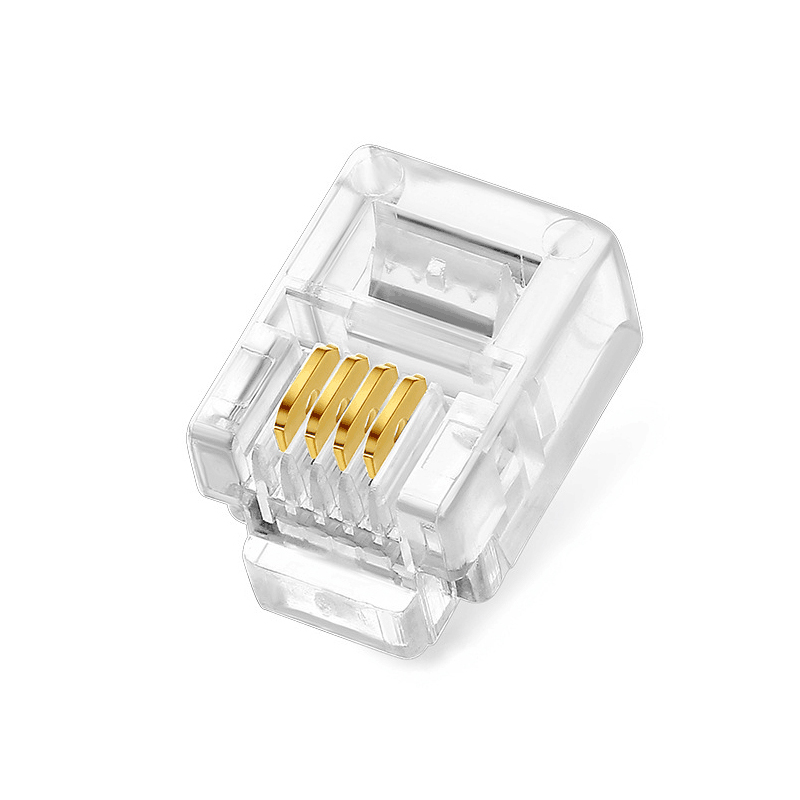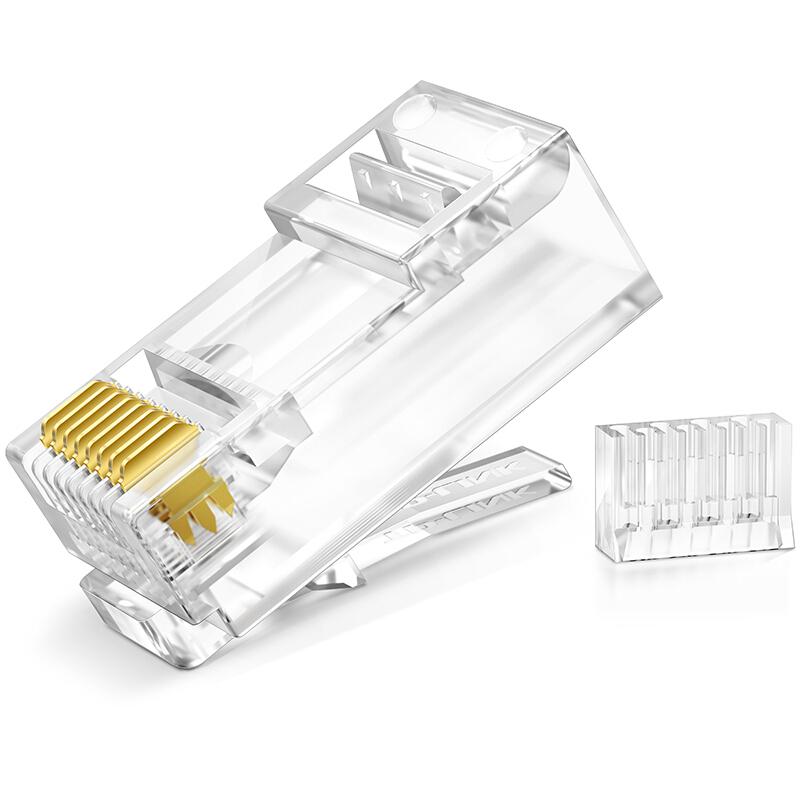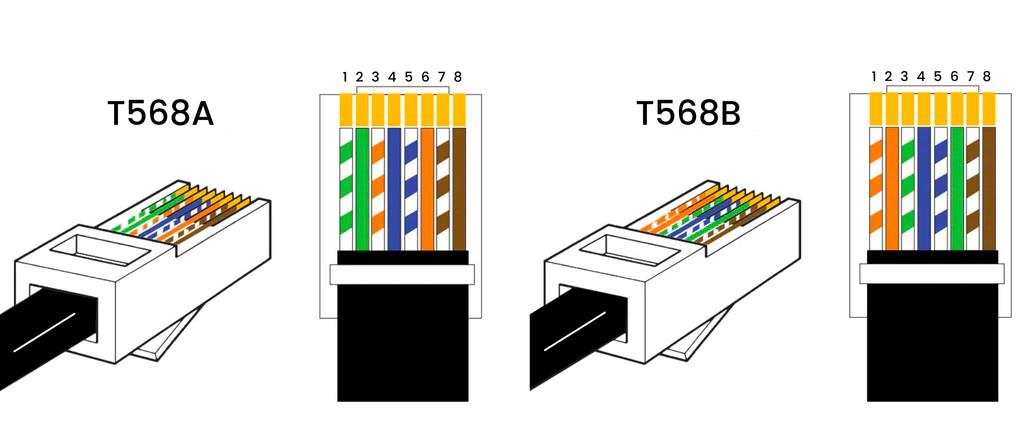Connector rj11 vs rj45
RJ11 and RJ45 are two common network and communication interfaces that have different purposes and physical characteristics. Here are their main differences:
What is RJ11 connector ?

RJ11 Purpose: Mainly used for telephone line connection. Commonly found in home phones, fax machines, and some modems.
RJ11 Pinout: he rj11 pinout has 6, but usually only 2 or 4 of them are used (for signal transmission and ground for the phone line).
RJ11 Connector size: Relatively small, usually shorter than RJ45.
RJ11 Cable type: Usually twisted pair cable is used, with one pair of wires used for signal transmission (usually two pairs of wires in a telephone).
RJ11 Shape: Connectors are narrow and plugs and sockets are generally smaller in shape.
RJ11 Transmission Speed: Applies to lower data transmission speeds such as telephone voice transmission and the lower rates of modems.
RJ11 cable:Low speed (suitable for voice transmission)
What IS RJ45 connector ?

RJ45 Purpose: Mainly used for computer networks and Ethernet connections. Widely used in local area network (LAN) connections such as computers, routers and switches.
RJ45 Pinout: The rj45 pinout has 8 pins, typically for each of the four twisted pairs.
RJ45 Interface size: Larger than RJ11 interface, the plug and socket are wider in shape.
RJ45 Cable type: Higher specification twisted pair cables are used (such as Cat5e, Cat6, Cat6a, Cat7) to support higher data transfer rates.
RJ45 Shape: Wider joints, larger plug and socket shapes.
RJ45 Transmission speed: Supports higher data transfer rates such as 10/100/1000 Mbps Ethernet, as well as higher Gigabit Ethernet and fiber optic networks.
RJ45 cable:High speed (supports 10/100/1000 Mbps, even 10Gbps)
RJ45 vs RJ11
The following is a comparison table between RJ11 and RJ45 connectores
| Attribute | RJ11 | RJ45 |
|---|---|---|
| Number of pins | 4 pins (2 are usually used) | 8 pins |
| size | Smaller | Larger |
| Main Applications | Telephone lines | Ethernet (LAN), data transmission |
| Common Uses | Home and office phones, modems | Computer network connections, switches, routers |
| Number of line pairs supported | 1 pair or 2 pairs | 4 pairs (8 lines) |
| Transfer speed | Low speed (suitable for voice transmission) | High speed (supports 10/100/1000 Mbps, even 10Gbps) |
| Wiring method | 2 lines or 4 lines | 8 lines |
| Type of cable used | Telephone lines (copper wires) | Network cable (such as CAT5, CAT6) |
| Typical voltage | 48V (telephone line) | 1-2V (Ethernet signal voltage) |
| Connector Appearance | Narrow | Wider |
| compatibility | Telephone equipment, modems | Network equipment, computers, switches, routers |
| Maximum length | Usually within 100 meters | Up to 100 meters (Ethernet standard) |
Why might you use an rj45 and rj11 connectors
what is rj11 used for
RJ11 is an interface for telephony and low-speed data transmission, suitable for home phones and fax machines.
what is rj45 used for
RJ45 is an interface used for network connections and is suitable for high-speed data transmission in Ethernet and computer networks.
Both have significant differences in physical shape and purpose, and although they look similar, they cannot be used interchangeably. When doing network or phone cabling, make sure you choose the correct connectors and cable types.
The RJ11 to RJ45 adapter is a converter used to connect telephone equipment to the Ethernet wiring system. Its main function is to connect telephone equipment (usually using the RJ11 interface) to the wiring system using the RJ45 interface. It is commonly found in places such as office buildings that use structured wiring.
The rj11 converter to rj45 can solve the connection problem of traditional telephone equipment in modern structured wiring systems, but it is not used for signal conversion, only for compatibility issues on physical connections.
RJ45 color code
The color coding of RJ45 connectors is used in standard Ethernet cabling to ensure proper signal transmission. There are two color coding standards for commonly used RJ45 cables: T568A and T568B. The difference between these two standards is the order of the colors of the pairs of wires, but their functions are the same.

T568A Color Order
Pin 1: White-Green
Pin 2: Green
Pin 3: White-Orange
Pin 4: Blue
Pin 5: White-Blue
Pin 6: Orange
Pin 7: White-Brown
Pin 8: Brown
T568B Color Order:
Pin 1: White-Orange
Pin 2: Orange
Pin 3: White-Green
Pin 4: Blue
Pin 5: White-Blue
Pin 6: Green
Pin 7: White-Brown
Pin 8: Brown
Color Coding Explanation:
White-Green/Green and White-Orange/Orange represent the two main pairs used for data transmission.
Blue/White-Blue and Brown/White-Brown are spare pairs, mainly used to support higher bandwidth networks (such as Gigabit Ethernet).
Straight-through Cable vs Crossover Cable:
Straight-through Cable: Both ends use the same wiring standard (T568A to T568A or T568B to T568B). Used to connect different types of devices, such as computers and switches.
Crossover Cable: One end uses T568A and the other end uses T568B. Used to connect the same type of devices, such as between two computers.
T568A vs. T568B:
T568B is the more commonly used standard in the United States and most network devices.
T568A is more in line with international standards, but is less used.
Summary:
T568A and T568B are two color-coded standards for RJ45, mainly used for Ethernet wiring.
T568B is more common, but both can be used as straight-through or crossover configurations, and the specific choice depends on the wiring needs and the compatibility of the network equipment.
